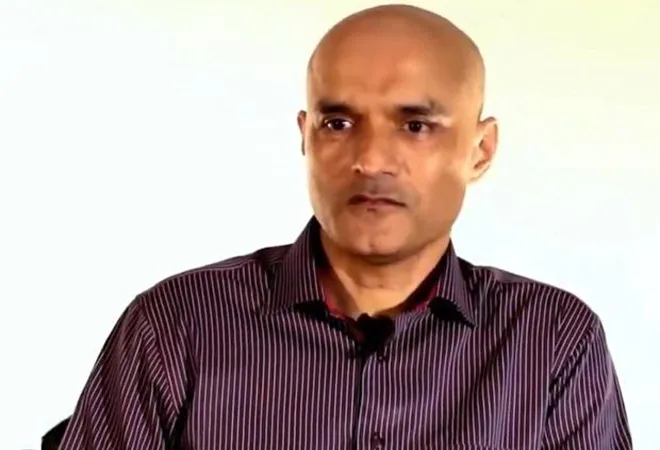
On 17 July 2019 the International Court of Justice (ICJ) delivered its final verdict on the Kulbhushan Jadhav case between India and Pakistan. With a 15-1 majority decision in India’s favour, the court found that Pakistan had breached its obligations under the 1963 Vienna Convention on Consular Relations (VCCR). On legal grounds — analysed below — the case is a clear victory for India. However, given that the ICJ can only provide limited remedies for relief, the question of Kulbushan Jadhav’s detention and his pending death sentence remains uncertain at best.
The story so far: A refresher
Jadhav was arrested by Pakistan on 3 March 2016 on the suspicion that he was a spy sent by India to conduct subversive activities in Pakistan. India was informed of Jadhav’s arrest on 25 March 2016 after an inexplicable 22-day delay. India claimed that Jadhav, who was carrying on a business in Iran post-retirement, was abducted and tried on false and fabricated charges of terrorism and espionage. Consequently, India made repeated requests for consular access to Jadhav, so as to visit him and arrange for his legal representation. This was not only denied by Pakistan, but was also made conditional upon receiving India’s assistance for investigation against Jadhav. Eventually, Jadhav was sentenced to death by Pakistan’s military court on grounds of espionage and terrorism on 10 April 2017.
India filed a case before the ICJ on 8 May 2017 accusing Pakistan of egregious violations of the VCCR. On 18 May 2017, the ICJ indicated provisional measures and ordered Pakistan to ensure that Jadhav was not executed, pending a final judgment by the court.
The findings and orders of the ICJ, can be divided into three sections as follows.
1. Pakistan fails in challenging jurisdiction and admissibility
At the outset, Pakistan had said that the ICJ had no jurisdiction over the case. Moreover, it claimed that India’s application could not admitted and heard, because it had not approached the ICJ with “clean hands”. This is a legal doctrine which, in this case, implied that India’s own wrongful conduct — by not providing due assistance in investigation — had disabled it from pursuing a legal remedy.
Both challenges were categorically rejected by the ICJ. The case was held admissible, and the ICJ confirmed its jurisdiction over the case by virtue of the Optional Protocol to the VCCR, to which both states are signatories.
This is a legal doctrine which, in this case, implied that India’s own wrongful conduct — by not providing due assistance in investigation — had disabled it from pursuing a legal remedy.
2. India’s overwhelming win on merits
The VCCR, the treaty subject to dispute here, was adopted with the aim to facilitate consular functions relating to nationals of respective countries. Article 36 of the VCCR defines the rights of consular officials when a national of their country is in prison, custody or detention. It includes:
- Informing competent authorities of arrest without “undue delay”,
- Guaranteeing the foreign national’s freedom to communicate with and access his consulate, and
- The right of consular officials to visit him and arrange for his legal representation.
The ICJ held that Pakistan was in clear violation of the rights and obligations described above. Pakistan, firstly, did not inform Jadhav of his rights to consular access under the VCCR. Secondly, the 22-day delay in informing India of Jadhav’s arrest was regarded as “undue delay,” given that his Indian nationality was established by Pakistan early on. Thirdly, despite repeated requests from India, it wrongfully denied consular access and even went so far as to condition it on India’s assistance on Jadhav’s investigation. Such a pre-condition is not only legally tenable, but also appears to be designed to coerce India to indirectly accept Jadhav’s “guilt” by agreeing to assist Pakistan with the investigation.
The ICJ held that Pakistan was in clear violation of the rights and obligations.
Pakistan had challenged the applicability of the VCCR to this case by arguing that, firstly, it does not apply to suspected cases of espionage and terrorism, and secondly, a 2008 bilateral agreement between the two countries modified the application of VCCR to sensitive (political and security) cases. The ICJ rejected these, because no such exception or modification is envisaged under the VCCR. It further emphasised that recognising espionage or terrorism as an exception will make it convenient for countries to forego their obligations under the VCCR in controversial cases.
3. Remedies may not give India what it wants
The ICJ declared that India is entitled to “restitutio in integrum,” an action which aims to restore a complaining party to the position it would have been in, had no right been violated. By way of remedy, the court ordered that Pakistan should give “effective review and reconsideration” to Jadhav’s conviction and sentence by “means of its own choosing.” In this regard, Pakistan must recognise that the right to a fair trial is “absolute” and “cannot be taken away” in this case. Additionally, it needs to give consular access to Jadhav, and fully examine the consequences of the Article 36 violation and any prejudice that has arisen due to it.
However, none of the other remedies sought by India were allowed by the court. The ICJ did not annul the death sentence handed out by Pakistan’s military court, and did not order the release of Jadhav to India. This is understandable; given that the ICJ does not function as a criminal appellate court over domestic cases, granting these remedies would have been entirely outside the ICJ’s jurisdiction.
Previous Article 36 cases: The problem of implementation
In light of the remedy offered by the court, it is useful to examine what were the implementation outcomes for similar cases before the ICJ. The findings and remedies in the Jadhav case with reference to Article 36 VCCR are along the same lines of the LaGrand case (Germany v. United States) and the Avena case (Mexico v. United States). In both the verdicts, the ICJ found that the US was in breach of its obligations under Article 36 VCCR, and directed it to give “effective review and reconsideration” to sentences and convictions of foreign nationals.
Apart from the directive that Pakistan should ensure a fair trial, there is little control that India can exercise over the judicial procedure it will choose to adopt.
Unfortunately, research papers (here and here) point out that the implementation of the decisions on ground was extremely poor and left much to be desired. Many US decisions opined that Article 36 rights could not be enforced in domestic courts and that no remedy under domestic law could be awarded, even if a violation was found. Several domestic courts carried out a so-called “review and reconsideration” without even mentioning or considering the findings of the LaGrand and the Avena case. Moreover, domestic courts decided that violation of Article 36 does not erase any past procedural antecedents; for instance, the accused foreign national cannot discard any statements or confessions made during the period of an Article 36 violation. If this is the case, Jadhav’s multiple videotaped confessions — the authenticity of which has been vociferously contested by India — will continue to be considered as a damning evidence in Pakistan’s courts.
In view of above, it remains to be seen how far and to what extent Pakistan’s courts will give effective review and reconsideration to the decision. Apart from the directive that Pakistan should ensure a fair trial, there is little control that India can exercise over the judicial procedure it will choose to adopt. If the case goes to the civilian courts, there is a glimmer of hope. However, if it continues to remain with the military court, we may not see a fair trial. Much depends on Pakistan’s openness towards the rules, principles and decisions tendered under public international law. This notion offers no reassurance to India, since Pakistan’s track record with obeying and complying with international legal obligations has never been up to the mark.
Remedies beyond ICJ’s remedy
At this stage, once India is given consular access, it can seek to equip Jadhav with the best possible legal defense under Pakistan’s laws. Apart from this, India has a few options for recourse should Pakistan’s actions be unsatisfactory. Though ICJ decisions are final and without appeal, India can approach the court again to:
- Interpret the judgment, should India and Pakistan differ on its meaning and scope, and
- To revise it, if new and crucial facts are discovered by India.
While these are not appeals, they provide India a supplementary avenue for relief on certain qualified grounds.
If Pakistan is unwilling to execute any of the ICJ’s orders, India can approach the United Nations Security Council, which is empowered to take binding measures to give effect to an ICJ judgment. However, this course of action depends on the concurrence of the P5 for decision-making, which includes Pakistan’s all-weather friend China. On its own level, India could suspend diplomatic relations, retaliate through sanctions, and push for public censure against Pakistan’s actions at the international stage. These tools at India’s disposal must be used cautiously, so as to not create friction between the two nations.
On legal grounds, the Jadhav case is a resounding victory for India and provides clarity to a country’s obligations under VCCR. However, the question of its implementation continues to loom large given the outcomes in previous VCCR cases. The safety of Kulbhushan Jadhav has been on the minds of the Indian public since the media was first seized of the matter. Though India may be reluctant to do so, leveraging diplomatic negotiations along with the “review and reconsideration” of Jadhav’s case, may yield a desirable solution to this ongoing saga.
The views expressed above belong to the author(s). ORF research and analyses now available on Telegram! Click here to access our curated content — blogs, longforms and interviews.




 PREV
PREV


